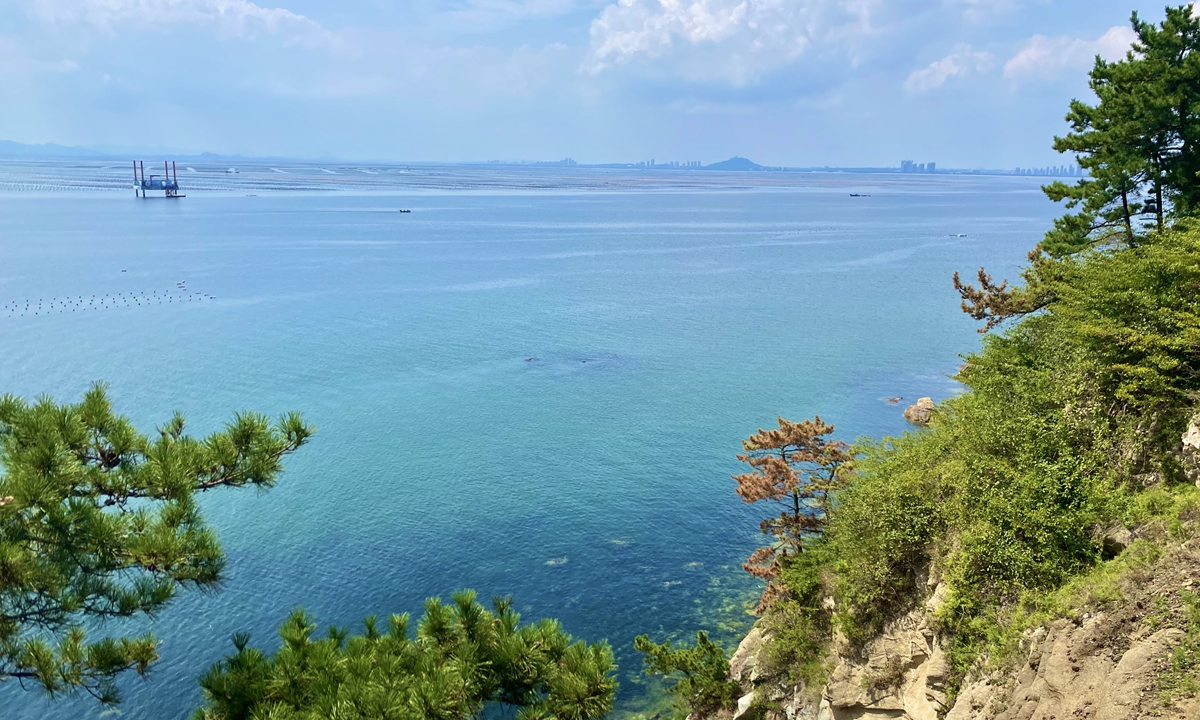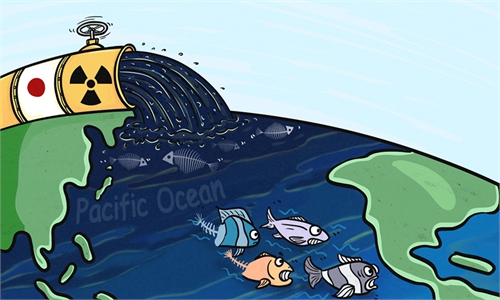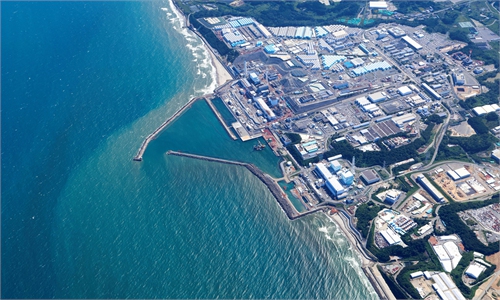
A marine ranching in Rongcheng, East China’s Shandong Province Photo: Shan Jie/GT
The dump of wastewater from the Fukushima Nuclear Power Plant in Japan has drawn increased attention to ocean environmental protection. At a conference on marine environmental protection held over the weekend in East China's Shandong Province, experts from various fields elaborated on China's efforts to protect the marine environment from multiple angles, including carbon reduction, legal construction, economic development, and technological innovation.
The 2023 Ocean Protection Conference, themed "Protecting the marine ecological environment and building an ocean ecological civilization," was convened in Rongcheng, Shandong Province on Saturday and Sunday.
At the conference, experts noted that the marine economy has become an important and robust growth driver in China's national economic development in recent years. However, the pressure on marine ecological environment protection in China has not been fundamentally alleviated, and the construction of a beautiful marine bay remains a daunting task.
Chen Shang, a researcher at the First Institute of Oceanography of the Ministry of Natural Resources, stated at the conference that the key criterion for evaluating the effectiveness of marine environmental protection is whether the bottom line of ecological security is maintained, noting that the assessment standard for maintaining marine ecological security should meet zero net ecological loss.
Chen explained that it involves promoting compensation for ecological damage caused by compliant natural development, marine resource development, and corporate social responsibility. "Whoever causes ecological damage should offer compensation, and companies should fulfill their environmental responsibilities. Furthermore, compensation should be provided for ecological damage caused by pollution incidents or non-compliant companies; those who pollute or damage should offer compensation," he noted.
Li Fang, a researcher at the National Marine Environmental Monitoring Center, introduced the establishment of the "government-led, enterprise-serving, and social-participating" collaborative approach to enhance the emergency response capacity for marine environmental incidents in the Lingshan Bay of Qingdao, Shandong.
In the Qingdao case, special attention is given to the promotion of specialization in ecological and disaster warnings and prevention for marine environmental and natural disasters, establishment of a mechanism for maritime cleaning and salvage, setting up of expert consultation systems, promotion of science-based decision-making, and strengthening of disaster responses.
Monitoring data released by the Ministry of Ecology and Environment recently showed that the overall condition of China's marine ecological environment remains stable, with overall improvement in seawater quality. In 2022, the proportion of Class I water quality areas in the jurisdictional waters reached 97.4 percent, maintaining overall stability. The proportion of nearshore areas with good water quality (Class I and II) increased by 0.6 percentage points to 81.9 percent compared to the previous year. The overall health of marine ecosystems has improved, eliminating the "unhealthy" status since 2021.
Meanwhile, several experts focused on carbon reduction efforts in the ocean, are advocating for the development of "blue carbon" resources.
Chai Qimin, the director of strategy and planning at the National Center for Climate Change Strategy and International Cooperation, stated at the conference that issues like ocean pollution and ocean acidification can harm the growth of marine organisms such as shellfish and coral, affecting the structure and function of the entire marine ecosystem and ultimately reducing the carbon sink capacity of the ocean. Therefore, promoting the protection and restoration of marine ecosystems is key to enhancing the ocean's carbon sink capacity.
"China's coastal blue carbon ecosystem has the potential to sequester approximately 1.2688 to 3.0774 million tons of carbon dioxide annually, representing enormous potential," Chai said.
To achieve their carbon neutrality goals, countries around the world are accelerating their efforts. Data shows that global investment in energy transition reached $1.11 trillion in 2022 (compared to $626 billion in 2020), with China consistently ranking as the world's largest investor for multiple years, according to Chai.
Jiang Qingzhe, Director of the China International Carbon Neutrality Research Institute, stated at the conference that due to the vast expanse and complex ecosystems of the ocean, human intervention in marine carbon sinks is very challenging. Coastal areas are transition zones between land and sea with rich ecosystems, making them susceptible to climate change and human activities.
One approach is to establish "zero carbon" demonstration zones in coastal areas. Additionally, establishing carbon funds can promote the integration of industry and capital development within the demonstration zones, facilitating high-quality industrial development, Jiang suggested.
In the face of the rapid growth of carbon emissions, countries worldwide are taking legislative and policy measures to reduce emissions, with 127 countries globally committing to carbon neutrality. China aims to peak its carbon dioxide emissions before 2030 and strive for carbon neutrality by 2060.




